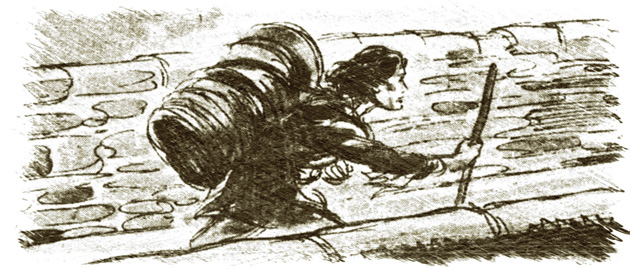A Guide to John Bunyan's The Pilgrim's Progress
Notes and Commentary on
The Pilgrim's Progressby Ken Puls
30. A Wall Called Salvation
Then said the Interpreter, The Comforter be always with you, good Christian; to guide you in the Way that leads to the City. So Christian went on his Way, saying,
Here I have seen Things rare and profitable,
Things pleasant, dreadful, Things to make me stable
In what I have begun to take in hand;
Then let me think on them, and understand
Wherefore they showed me were, and let me be
Thankful, O good Interpreter, to thee.Now I saw in my dream, that the highway up which Christian was to go, was fenced on either side with a wall, and that wall was called Salvation. Up this way therefore did burdened Christian run, but not without great difficulty, because of the Load on his back.
Notes and Commentary
Christian leaves the House of the Interpreter with a hymn of thanksgiving in his heart and the promise that the Comforter, the Spirit of God, will always be with him. God is doing a saving work in his heart. The Spirit of God has illumined the truth of the Word of God and Christian is nearing the cross. What was once a faint view of "yonder shining light" is now an impassioned, impending hope. As Christian continues on his journey, he realizes that his path now lies with the walls of Salvation.
The imagery of a wall is taken from the "Song of Salvation" in Isaiah 26 which begins:
In that day this song will be sung in the land of Judah:
"We have a strong city;
God will appoint salvation for walls and bulwarks" (Isaiah 26:1).Bunyan had used this imagery before, when he related his own desire for salvation in Grace Abounding to the Chief of Sinners:
About this time, the state and happiness of these poor people at Bedford was thus, in a dream or vision, represented to me. I saw, as if they were set on the sunny side of some high mountain, there refreshing themselves with the pleasant beams of the sun, while I was shivering and shrinking in the cold, afflicted with frost, snow and dark clouds. Methought, also, betwixt me and them, I saw a wall that did compass about this mountain; now, through this wall my soul did greatly desire to pass; concluding, that if I could, I would go even into the very midst of them and there also comfort myself with the heat of their sun.
About this wall I thought myself, to go again and again, still prying as I went, to see if I could find some way or passage, by which I might enter therein; but none could I find for some time. At last I saw, as it were, a narrow gap, like a little doorway in the way, through which I attempted to pass; but the passage being very straight and narrow, I made many efforts to get in, but all in vain, even until I was well-nigh quite beat out, by striving to get in. At last, with great striving, methought I at first did get in my head, and after that, by a sidling striving, my shoulders, and my whole body. Then I was exceeding glad, and went and sat down in the midst of them, and so was comforted with the light and heat of their sun.
Now, this mountain and wall, etc., was thus made out to me—the mountain signified the church of the living God; the sun that shone thereon, the comfortable shining of His merciful face on them that were therein. The wall, I thought, was the Word, that did make separation between the Christians and the world; and the gap which was in this wall, I thought was Jesus Christ, who is the way to God the Father (John 14:6; Matthew 7:14). But forasmuch as the passage was wonderful narrow, even so narrow, that I could not, but with great difficulty, enter in thereat, it showed me that none could enter into life, but those that were in downright earnest, and unless they left this wicked world behind them; for here was only room for body and soul, but not for body and soul, and sin.
[Grace Abounding to the Chief of Sinners, par. 53-55]
The little doorway in the wall, representing Jesus Christ, is pictured as the Wicket Gate in The Pilgrim's Progress. Now inside the Way, and fenced in by the walls of Salvation, Christian runs, "but not without great difficulty, because of the Load on his back." This Load is the guilt and conviction that weighs heavy on Christian because of his sin. It is a burden he must carry until he discovers the place of relief.
Continue Reading 31. Christian Arrives at the Cross
Return to 29. A Frightening Dream
The text for The Pilgrim's Progress
and images used are public domain
Notes and Commentary ©1997 Ken Puls"A Guide to John Bunyan's The Pilgrim's Progress"
was originally published from January 1993 to December 1997
in "The Voice of Heritage," a monthly newsletter
of Heritage Baptist Church in Mansfield, TexasUnless otherwise indicated, all Scripture quotations are from
the New King James Version (NKJV) ©1982 by Thomas Nelson, Inc.Return to A Guide to John Bunyan's The Pilgrim's Progress
